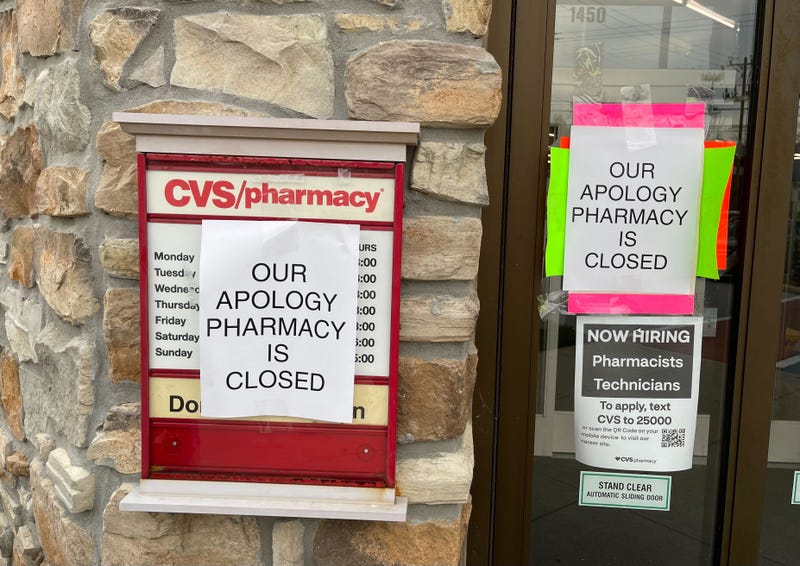
As public health officials encourage the public to get vaccinated for the flu and COVID-19, pharmacies across the country are having a hard time keeping up with demand.
This summer, 80 percent of pharmacies that responded to a National Community Pharmacists Association survey said it was hard to fill open positions, close to 90 percent said it was hard to find pharmacy technicians and 60 percent said it was hard to find front-end staff.

Since then, booster shots of COVID-19 vaccines have also been made available in addition to the initial doses and COVID-19 tests.
Recently, two women told USA Today they were turned away when they went to get flu shots due to worker shortages at their local pharmacies.
Sarah Tuttle, a mom of a 7-year-old and a 14-year-old, went to a Seattle, Wash., Rite Aid this month to get flu shots. She expected that they would be able to walk right in and get them, as they had in the past.
However, what she found was a stressed pharmacy worker who informed her that they were not doing walk-ins.
"People peeled out of the line," said Tuttle. "It was clearly not just us."
"Like most pharmacies and retailers, Rite Aid is experiencing some staffing challenges in different regions," Rite Aid spokesman Brad Ducey said in an email, according to USA Today. "Our pharmacy teams are working hard to address high demand for COVID-19 vaccinations and testing amid the nationwide labor shortage. As a result, customers may experience slightly longer wait times for vaccinations."
He recommends that people make appointments for their shots.
People with children or who know others who can’t make appointments for themselves should also try to schedule shots.
Elizabeth Arnold, a 34-year-old traveling nurse based in the Dallas-Fort Worth area, is required to get a flu shot for her job. She had a day off from the Charlottesville, Va., hospital where she was recently stationed and decided to walk in to get her flu inoculation.
Arnold hadn't scheduled an appointment and she was turned away at a CVS pharmacy located inside a Target store.
"There was nobody there," said Arnold. "The gal was like, 'Yeah, no, you have to have an appointment.' I was like, 'Please, can we just do this real quick, we could have had this done already when we started the conversation.' She was like, 'No, sorry.'"
Pharmacy staff told Arnold the next appointment would be available two days later. She decided to schedule a shot back home in Texas.
CVS spokesman Joe Goode said his company also recommends making an appointment for vaccines.
Like many other employers in the wake of the COVID-19 pandemic, CVS is dealing with a "tight retail labor market" said Goode.
Even with warnings about a "twindemic" of influenza and COVID-19, the Centers for Disease Control and Prevention estimate there has been a 34 percent decrease in the number of adults who received flu shots through Oct. 9 compared to last year. So far, only 11.5 million people have received their shot versus 17.4 million in 2020.
Though flu infection rates dropped last year, experts believe that could be tied to COVID-19 lockdown measures that are no longer in place.
At locally-owned drug stores and pharmacies, owners and staff need to fill the staffing gap, said B. Douglas Hoey, a pharmacist and CEO of the National Community Pharmacists Association. Some are working up to 70 hours a week, he estimated.
Large chains have tried to pivot by hiring additional employees and paying them more, said Mike Johnston, CEO and founder of the National Pharmacy Technicians Association.
Both CVS and Walgreens recently announced plans to raise their starting wages to $15 an hour. Walgreens is also offering a signing bonus of up to $1,250 for both full and part-time pharmacy technicians through the end of October. Even so, the company said it may have to cut store hours if it can’t find enough staff to deal with the demand for vaccines.
"There's not the supply available to meet the demand right now," Johnston said. "The situation we're in right now, there’s not enough money you can throw at this problem."
Arun Sundaram, a corporate analyst at CFRA Research who has studied Walgreens and Rite Aid said research shows that these large pharmacies "genuinely lack staff as they face increased workloads," according to USA Today.
"The labor issue in pharmacy is exacerbated by the fact that these pharmacies have been given little to no lead time in our response to fighting this pandemic," Sundaram said. With the rollout of booster shots, pharmacies are responsible for administering more shots than they were during the early vaccine rollout efforts, when more public health agencies stepped in, he added.
"These pharmacists, these pharmacy techs – they're voicing the same concerns of all other industries. They've been working day in, day out since the pandemic started. They want better pay, they want better benefits as well," said Sundaram.
Though Doctor's offices are doing a better job of keeping pace than pharmacies, their flu shot rates are still down 13 percent over last year, said USA Today.
Soon, COVID-19 vaccines for children age 5 to 11 are also expected to become available at local pharmacies and doctor’s offices, potentially adding to the already voluminous workload of pharmacy technicians.

